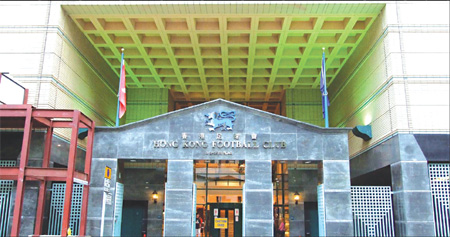Clubs continue to wield influence
Updated: 2010-06-29 07:37
By HONG LIANG(HK Edition)
|
|||||||||
|
The entrance to the Hong Kong Football Club (HKFC). The government has been most supportive of many non-profit making clubs, such as the HKFC, through the grant of land leases at nominal cost. Provided to China Daily |
A private club is a second home to many of its members. In this sanctum of privacy, a member may chat with like-minded friends over a drink at the bar, or, if he pleases, eat a solitary meal served by waiters he knows by name. He can relax over a game of pool or just sink into the overstuffed sofa to read the daily newspapers.
Here, we're talking about the non-profit making clubs and not your neighborhood health club that charges you a fortune for the privilege of torturing yourself. Since the early colonial days, the Hong Kong government has been most supportive of many non-profit making clubs through the grant of land leases at nominal cost. These include various sports clubs, like the Royal Yacht Club and Football Club, and recreation clubs for civil servants and working journalists.
This arrangement was fine and well until last week when a local newspaper raised a storm in a teacup alleging that some clubs enjoying government subsidies have failed to fulfill their obligations to open part of their facilities to eligible groups, such as schools, youth clubs and welfare organizations as directed by the authorities.
The matter was taken up in the Legislative Council, by Civic Party's Tanya Chan, who complained that the terms of some of the land leases to private clubs were "too favorable," and urged the government to review the land grants when they come up for renewal. In reply, Secretary for Home Affairs Tsang Tak-sing conceded that the terms of the land leases "may have become outdated." But he assured Chan that the clubs may retain possession of the land as long as they continue to adopt a non-discriminatory membership policy.
This is as good an answer as we can expect from the government. Whatever action it may take, it is important to bear in mind that the club culture has been an integral part of the Hong Kong social fabric since its transformation from a fishing village to a trading outpost in the 19th century. Other than those few exclusive clubs for expatriates housed in imposing buildings on the choicest sites in the city, there were many big and small "huiguan" in the Chinese sector where people of the same trade or who came from the same county on the mainland met and socialized.
Other than playing mahjong and sipping kung fu tea, the Chinese merchants of the "huiguan" created and funded a charity enterprise comprising hospitals, medical clinics, orphanages, seniors homes and child care centers that have benefited millions of less fortunate fellow citizens in Hong Kong. Many of those institutions, the Tung Wah Group of Hospitals, Po Leung Kuk and others, continue to provide quality health care and other services at affordable costs to the community although many of those old "huiguan" are long gone.
The clubs of today are quite different from the "huiguan" of the past. But the tradition of self reliance and compassion, fostered in the wood-paneled halls of those old establishments, must be allowed to live on in the bars, restaurants and golf courses of the new private clubs.
I don't know exactly how favorable the land lease terms are for, say, the golf club in Shek-O. But I'd rather see a vast expanse of well-kept lawn carefully preserved by the club than another monstrous housing estate in one of the few remaining idyllic corners of Hong Kong.
(HK Edition 06/29/2010 page2)
